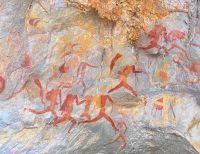– As researchers, we have the responsibility for the stories we request, are told, analyze, and retell. Do our descriptions or representations of violence provide an increased understanding of the field, the victims, the abusers, the acts of violence, the consequences of the violence and its response? Or does it only contribute to more, and quite similar, descriptions of violence? To sensationalization, where the victim becomes a character in violent narratives? Anette Bringedal Houge asks.
 Postdoctoral research fellow Anette Bringedal Houge Photo: Private
Postdoctoral research fellow Anette Bringedal Houge Photo: Private
That researchers are reluctant to contribute to sensationalization of violence is important, Houge thinks.
– When working on my PhD-project on conflict-related sexual violence, I saw how much of the early literature on the subject described, in detail, how brutal violence could be. The shock effect, or sensationalization, gave attention to the subject, Houge says.
Houge is currently researching production of evidence in rape cases, and is a postdoctoral research fellow at the Department of Interdisciplinary Health Science at the University of Oslo.
How should researchers write about violence that is sensational, without contributing to the sensationalization of violence?
– Detailed, sensationalized descriptions of violence do something to our ability to understand and see the people behind the violence, and the complicated, structural causes of violence. We need to see more than monstrous abusers and broken victims, Houge says.
Today, it has been a shift from the sensationalization of violence to emphasize the seriousness and the need to understand, analyze and deal with it, to a thorough criticism of these detailed descriptions.
– This shift – that my PhD-project ended up in the middle of – felt so right, important, and necessary that the pendulum perhaps swung too far in the opposite direction. Now we read articles and books about conflict-related violence, where the researchers do not describe the violence at all, Houge says.
– This is a result of conscious choices, and increased awareness and understanding of what narratives about violence, abusers and victims do. But violence can be extremely brutal. The core of some forms of violence is precisely that it is excessive and brutal, in every way. How do we talk about violence that is sensational, without contributing to the sensationalization of violence? she asks.
In the article «Violent re-presentations: Reflections on the ethics of re-presentation in violence research», first published in Qualitative Research, Houge is reflecting on these questions.
Practical research ethics is about discretion and balance
– Ethical guidelines for research describe research ethical norms, responsibilities and obligations, but a lot of research ethical practices are about balance. Different considerations are weighed against each other, and dilemmas are resolved by exercising discretion. In situations like these there is no definitive answer to what we should do, Houge says.
Houge discusses ethical dilemmas researchers face when working on sensitive topics, such as sexual violence. She shares experiences from her own research projects, and situations she experienced as challenging. Both during field work and when the results are written about in publications.
– In the article, I address several issues within research ethics, questions which I do not necessarily have the answers to myself. It is an invitation to reflect upon the ethics of re-presentation in violence research, Houge says.
– Hopefully it also contributes to the literature on how we talk about and with people with vulnerable life situations and difficult life experiences in our research.
Houge uses experiences from her own project to reflect on ethical challenges
During her PhD-project, Houge got the opportunity to travel to Bosnia-Herzegovina to interview various actors connected to the international criminal justice project, 20 years after the war.
– I read many articles which criticized the way Western academics, journalists and activists talked about and sensationalized violence, and through this the people who have experienced violence and war crimes in the conflicts we write about, but which we have not lived through ourselves, Houge says.
– When the opportunity to interview people who had experienced the conflict in Bosnia-Herzegovina understood and defined the role of criminal justice in relation to the conflict arose, it was an opportunity to include important perspectives on my own project, she says.
The interviewees were not asked to describe the violence they experienced during the war
Several of the interviewees Houge talked to in Bosnia-Herzegovina had experienced torture and sexual violence during the war.
– Many had been interviewed by other researchers the past years, since the war ended, and several had been interviewed many times, Houge says.
After the interviews, many participants talked about their own, unsolicited experiences with violence. They said they noticed that they were not asked to describe the violence during the interview, and thanked Houge.
– They explained that academics often were more concerned with describing them as victims of violence, not as citizens or whole persons. This made an impression, but the violence they had survived was also part of their stories, that they wanted me to know about, Houge says.
Interviewees used descriptions of violence to explain what justice was to them
Other interviewees used the violence as a starting point to explain what justice meant, or could mean to them, 20 years after the war. In response to the question of what justice were, one interviewee responded by describing the torture he had been subjected to in detail. He laid down on the floor and showed off the positions he had been forced into.
– I became concerned that my question had been lost in translation and said that he did not have to describe his experiences. He assured me that he had understood the question. To be able to give an answer, he first needed us to see and know how humiliating the violence he was subjected to was, Houge says.
– He ended the interview by saying that for his sufferings there was no justice, and the criminal justice system was the closest he could get to it, Houge says.
– The violence was part of his story. How can we give a truthful description of the origin, causes and consequences of violence, and being considerate towards the victims, without making the retelling itself violent? she asks.
The article gave inspiration to a book project
After the article was published, Houge was contacted by both Norwegian and international researchers, who shared their own stories and experiences of exercising discretion and countering ethical dilemmas in their fieldwork and when publishing results from their research.
The stories gave inspiration to a textbook on the exercise of discretion and practical research ethics, that will be published in the autumn of 2024. Houge and Anja Emilie Kruse, researcher at the Norwegian Centre for Violence and Traumatic Stress Studies (NKVTS), have received funding from The Norwegian Non-Fiction Writers and Translators Association (NFFO) and The Fritt Ord Foundation to edit and publish the book under the Scandinavian University Press.
– It will be a Norwegian "book of failures", about ethical discomfort, researchers' fallibility, and what we can learn from it, says Houge.
– The book will be based on the mistakes we have made, the discomfort we have caused, and all the unresolved or unsolvable dilemmas we face when doing research on sensitive topics. It will bring together some of the country's best and most exciting qualitative researchers, she concludes.
















